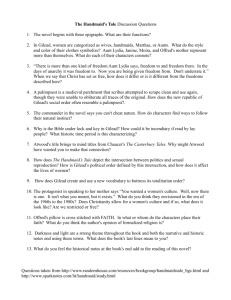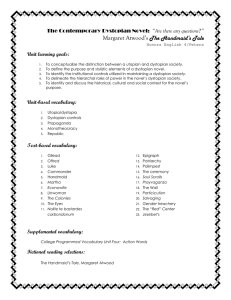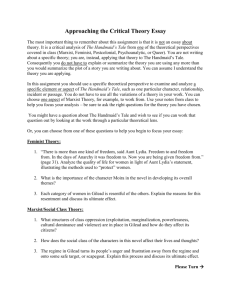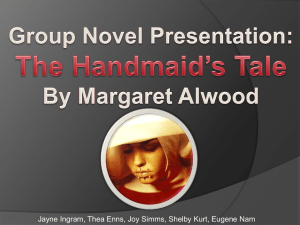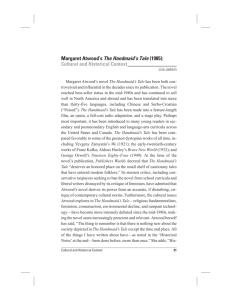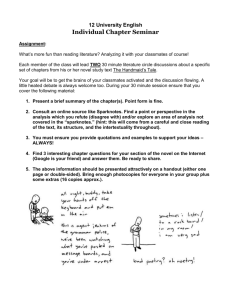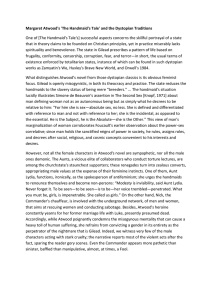Senior AP/IB English Summer Assignment 2008
advertisement
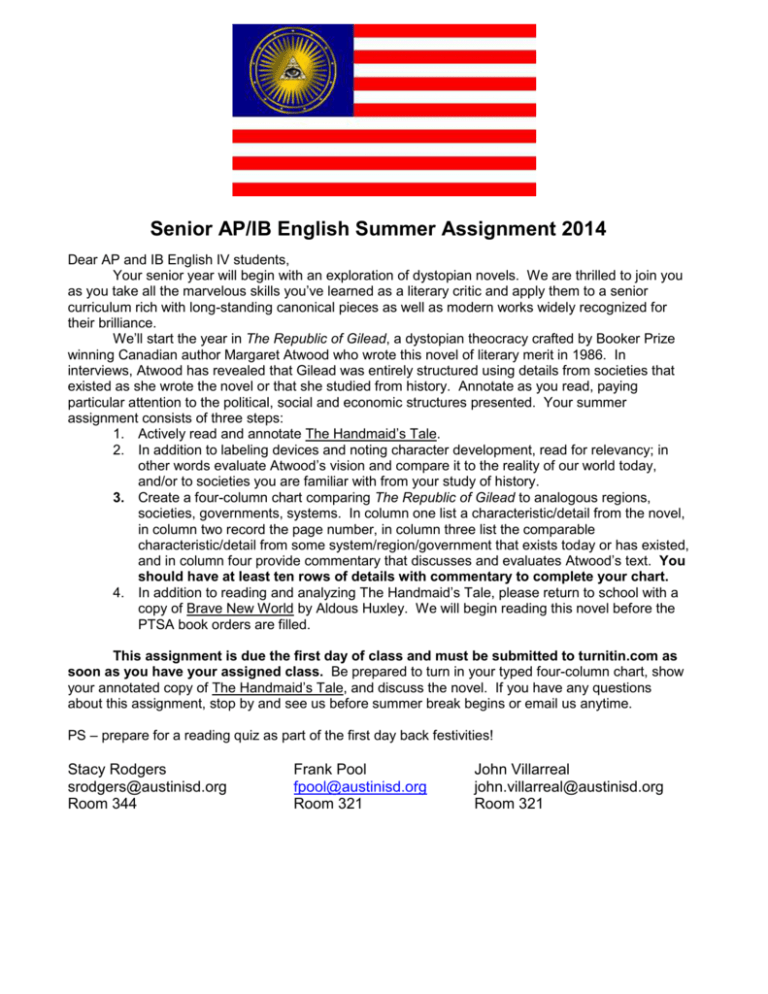
Senior AP/IB English Summer Assignment 2014 Dear AP and IB English IV students, Your senior year will begin with an exploration of dystopian novels. We are thrilled to join you as you take all the marvelous skills you’ve learned as a literary critic and apply them to a senior curriculum rich with long-standing canonical pieces as well as modern works widely recognized for their brilliance. We’ll start the year in The Republic of Gilead, a dystopian theocracy crafted by Booker Prize winning Canadian author Margaret Atwood who wrote this novel of literary merit in 1986. In interviews, Atwood has revealed that Gilead was entirely structured using details from societies that existed as she wrote the novel or that she studied from history. Annotate as you read, paying particular attention to the political, social and economic structures presented. Your summer assignment consists of three steps: 1. Actively read and annotate The Handmaid’s Tale. 2. In addition to labeling devices and noting character development, read for relevancy; in other words evaluate Atwood’s vision and compare it to the reality of our world today, and/or to societies you are familiar with from your study of history. 3. Create a four-column chart comparing The Republic of Gilead to analogous regions, societies, governments, systems. In column one list a characteristic/detail from the novel, in column two record the page number, in column three list the comparable characteristic/detail from some system/region/government that exists today or has existed, and in column four provide commentary that discusses and evaluates Atwood’s text. You should have at least ten rows of details with commentary to complete your chart. 4. In addition to reading and analyzing The Handmaid’s Tale, please return to school with a copy of Brave New World by Aldous Huxley. We will begin reading this novel before the PTSA book orders are filled. This assignment is due the first day of class and must be submitted to turnitin.com as soon as you have your assigned class. Be prepared to turn in your typed four-column chart, show your annotated copy of The Handmaid’s Tale, and discuss the novel. If you have any questions about this assignment, stop by and see us before summer break begins or email us anytime. PS – prepare for a reading quiz as part of the first day back festivities! Stacy Rodgers srodgers@austinisd.org Room 344 Frank Pool fpool@austinisd.org Room 321 John Villarreal john.villarreal@austinisd.org Room 321 SAMPLE CHART: Detail “Resettlement of the Children of Ham is continuing on schedule,” says the reassuring pink face, back on the screen. “Three thousand have arrived this week in National Homeland One, with another two thousand in transit.” “Nearly all children nowadays were horrible…they adored the Party and everything connected with it. The songs, the processions, the banners, the hiking, the drilling with dummy rifles, the yelling of slogans, the worship of Big Brother” PG 19 24 Application During World War 2, over 100,000 Japanese Americans were forcibly interred in Civilian Assembly Centers, Relocation Centers, and/or detention camps. Militant groups employ children throughout the world to carry out nationalistic, racially or religiously motivated vendettas. See Sri Lanka (http://timesofindia.indiatimes.com/World/Lanka -to-rehabilitate-child-soldiers-recruited-by-LTTE/articleshow/4573579.cms) Congo (http://www.amnesty.org/en/library/info/AFR62/0 34/2003) Et al. Commentary The understated tone Orwell uses in this passage effectively conveys the uncanny ubiquity of Big Brother in this Oceania and the fear BB exercised over his citizens. While the matter-of-fact tone (“simply,” “usual”) reveals Winston’s acceptance of this control, the degree to which he reflects on his possible annihilation (“abolished, annihilated, vaporized”) conveys the fear and resentment he carries. This sort of fear is realized by minority groups in even the most democratic of states today, as evidenced by the difficulties minority Middle Eastern travelers faced in airports in the years following 9-11. Winston’s disgust at these children evinces a few sentences later when he considers a Spy child hailed in the newspaper as a hero to be more of an “eavesdropping little sneak” (24). While Winston locates most of his mistrust and anger directly on the heads of the children (for reasons that become clearer as his story arc develops), Big Brother clearly recruits and manipulates children into serving as vehicles by which they instill fear and maintain control.
